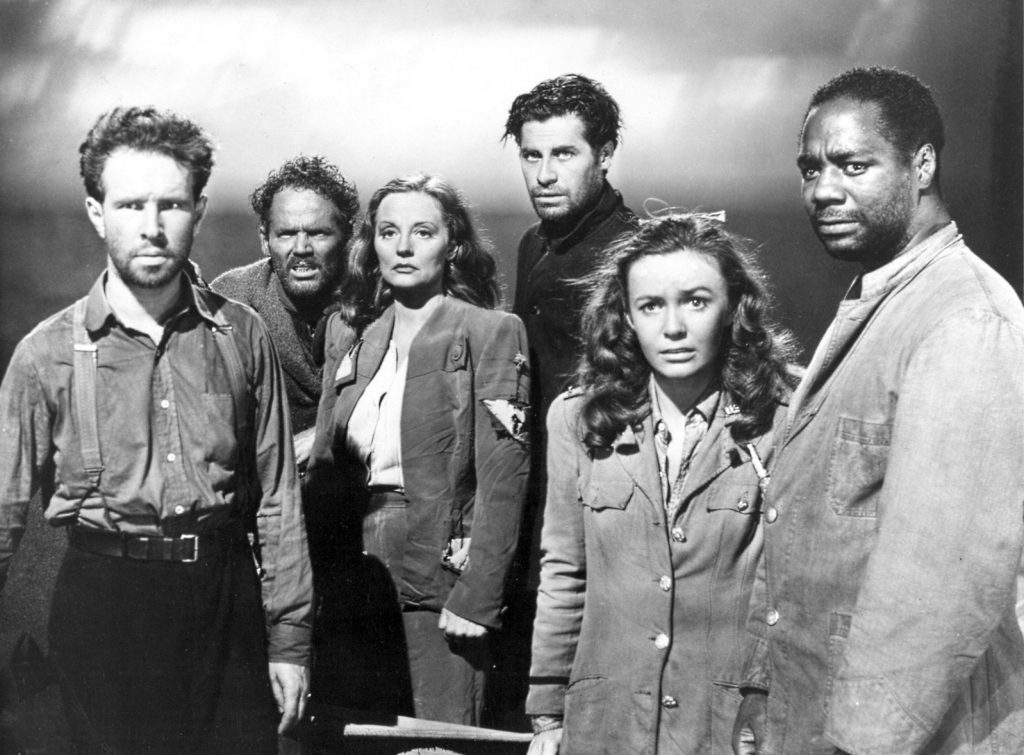Lifeboat (1944)

One of director Alfred Hitchcock’s (Suspicion, Mr. and Mrs. Smith) more experimental films puts all of the action within the confines of a lifeboat for the duration, becoming what some claim is the smallest set ever used for a major motion picture release. The boat is the destination for several survivors, a mix of American and British, of a Nazi German U-boat attack that sees their ship sink in the North Atlantic, also taking down the submarine in the process. With little in rations to sustain themselves, life is uncertain, made more so when they pick up a German survivor (Slezak, People Will Talk) of the downed U-boat. Rancor erupts on the boat, with some of the survivors wanting to take out the Nazi bastard while the more pacifist of the group would rather keep him on board to hand him over as a prisoner of war. The German earns his keep on the lifeboat by helping out with the navigation and an impromptu amputation, but it soon becomes apparent that he may not be as benign as he lets on.
John Steinbeck’s Oscar-nominated story provides the inspiration for this ambitious early Hollywood Hitchcock vehicle, but if not for the strength of a visionary director and a cast of superb character actors, all might have been for naught in the interest category. Academy Award nominations would also go to Hitch for his direction and the impressive cinematography by Glen MacWilliams (The Front Page, Wing, and a Prayer). In the acting category, Tallulah Bankhead (Fanatic, A Royal Scandal) steals the show in a vanity piece that is both funny and endearing in its quaint way.
Though a classic by today’s standards, and one of Hitchcock’s many great films, at the time of its release Lifeboat suffered its share of controversy, primarily for making the Nazi a somewhat likable character. Of course, if you’ve seen the film, you’ll know that he’s not all he’s cracked up to be, but when the Nazis are later found out to be the face of pure human evil, there would be a bit of backlash at seeing a relatively normal portrayal. Another complaint is that he’s too skilled, with his propensity for language, surgery, navigation, and other attributes, with the suggestion being that the Nazis are really living up to their “supermen” potential. Interestingly, those on the other end of the spectrum think it’s a veiled propaganda film meant to drum up even more rah-rah for the Allied side. The fact that Hitchcock would also direct two actual short propaganda films (Bon Voyage, Aventure Malgache) right around the same time furthers the suspicion.
I don’t think it’s important to speak to the political motivations of the film when there is entertainment to be had in the story itself. The characters are a microcosm brought together for survival, like a precursor to the many disaster films that would become a staple of cinema in future decades. Few, if any, are as compelling, with characters that are surprisingly well rounded, rather than the cookie cutter fodder we’ve grown accustomed to seeing. In the middle of this harrowing tale, Hitch finds time for a choice romantic comedy, gripping drama, solid adventure, and excellent thrills and chills.
In my opinion, Lifeboat stands as Hitchcock’s most underappreciated of films in a filmography full of them. Perhaps it is because Hitchcock stays appropriately subdued in his approach, only touching on a few trademark techniques when he could sneak them in. As you watch the film, you often forget that it’s one of his. That’s OK by me, as this is one of his films where the story takes the center stage, while his direction and a fine cast provide the fuel for the mystery to run. My personal favorite Hitchcock film of the 1940s.
Look quick for Hitchcock’s trademark cameo, cleverly displayed in a newspaper advertisement boasting his real-life weight loss in a “Before and After” pictorial.
Qwipster’s rating: A+
MPAA Rated: Not rated, but probably PG for some violence and themes
Running time: 96 min.
Cast: Tallulah Bankhead, William Bendix, Hume Cronyn, Walter Slezak, Mary Anderson, John Hodiak, Henry Hull, Heather Angel, Canada Lee
Director: Alfred Hitchcock
Screenplay: Jo Swerling (based on the story by John Steinbeck)
